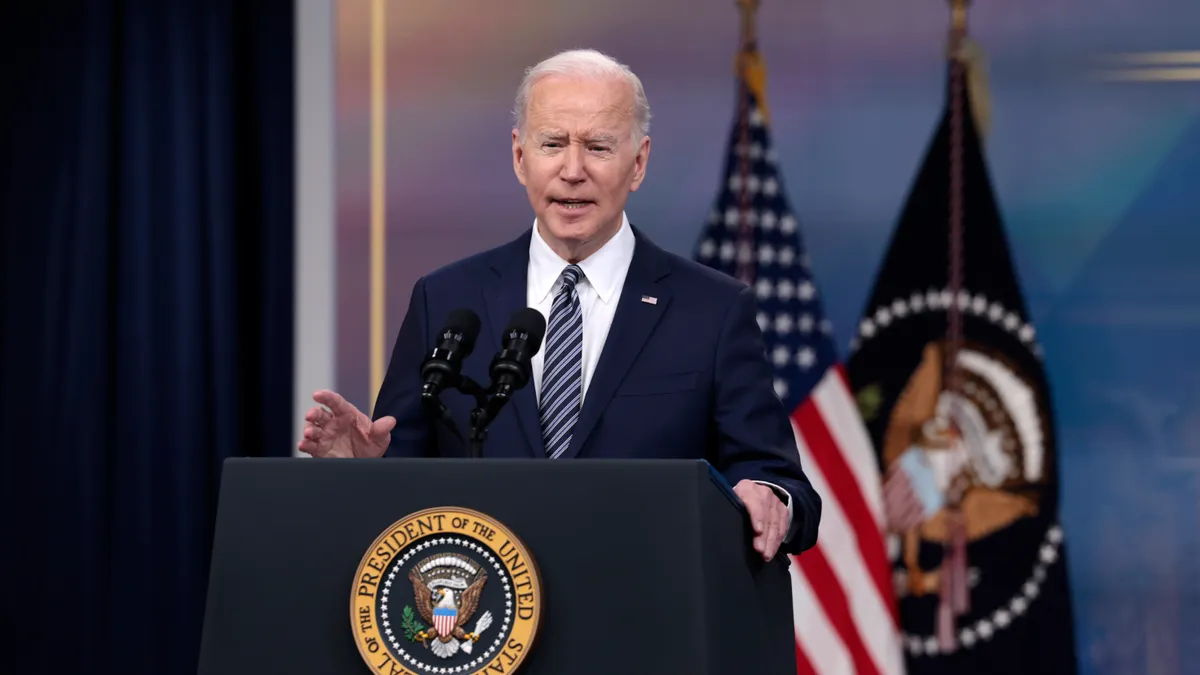Dive Brief:
- In an effort to increase U.S. energy independence, President Joe Biden on Thursday invoked the Defense Production Act to spur domestic mining and processing of minerals used to make batteries for electric vehicles and energy storage facilities.
- The move will support the production and processing of lithium, nickel, cobalt, graphite and manganese, the White House said in a statement. The Department of Defense will follow "strong" environmental, labor, community and tribal consultation standards as it implements Biden’s directive to conduct feasibility studies.
- The Biden administration's action invoking the DPA is "limited in scope," but sends a markets signal, according to the National Mining Association. "Unless we continue to build on this action, and get serious about reshoring these supply chains and bringing new mines and mineral processing online, we risk feeding the minerals dominance of geopolitical rivals," said Rich Nolan, NMA CEO.
Dive Insight:
Biden took a two-part path on Thursday to addressing rising energy costs: releasing up to 1 million barrels a day for six months from the Strategic Petroleum Reserve and using the DPA, a Cold War relic, to bolster domestic battery production.
The United States imports most of the minerals used in lithium-ion batteries, according to a February report from the Department of Energy.
"We need to embrace all the tools and technologies that can help free us from our dependence on fossil fuels and move us toward more homegrown clean energy technologies made by American companies and American workers," Biden said during a press briefing Thursday. "We need to end our long-term reliance on China and other countries for inputs that will power the future."
The Biden administration's action invoking the DPA is "limited in scope," but sends a markets signal, according to the National Mining Association.
"The minerals supply chain that will drive the electrification of our transportation sector and the energy transition is not only at risk from a perilous and growing import dependence, but the approaching minerals demand wave is set to strain every sector of the economy and requires an urgency in action from government and industry never before seen," Rich Nolan, NMA CEO, said in a statement Friday. "Unless we continue to build on this action, and get serious about reshoring these supply chains and bringing new mines and mineral processing online, we risk feeding the minerals dominance of geopolitical rivals."
A DPA determination issued Thursday authorized the Defense Department to conduct feasibility studies for "mature mining, beneficiation, and value-added processing projects; by-product and co-product production at existing mining, mine waste reclamation, and other industrial facilities; mining, beneficiation, and value-added processing modernization to increase productivity, environmental sustainability, and workforce safety."
Biden is considering using the DPA to address other parts of the energy sector, according to the White House statement.
Russia and China control significant amounts of the minerals needed to build batteries and it is "imperative" that the U.S. be able to produce them to shift to a clean energy future, Sheila Hollis, United States Energy Association acting executive director, said in a statement.
Sen. Bill Cassidy, R-La., said the move was "encouraging," but said it wouldn’t be effective without permitting reforms.
"Enacting the DPA without addressing the bureaucratic logjam of permitting would be little more than symbolism," Cassidy said in a statement. "We have to also streamline the permitting process that could delay any effort by years."
The Natural Resources Defense Council urged the Biden administration to focus on recycling minerals needed for batteries.
"Rather than just digging up or importing more, we should start with improved recovery and waste reduction throughout supply chains," Bobby McEnaney, NRDC senior lands analyst, said in a statement.















